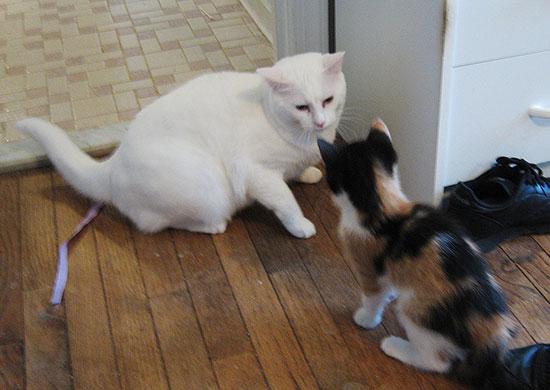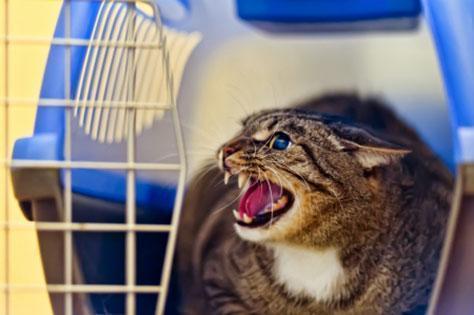This content is archived from the Feline Nutrition Foundation
If You're Feeling Stressed, So Is Your Cat
- Updated: Thursday, May 02, 2019 01:08 PM
- Published: Monday, April 12, 2010 11:16 AM
- Written by Ingrid King
 We live in challenging times and external stressors abound. Our work, the news and often just getting through the day all present a source of stress for people. It's known that owning a pet has beneficial effects on our health.¹ Pets help us slow down. We get so caught up in the business of our daily lives that we rarely take enough time to stop and take a break. Studies have shown that even a few minutes of petting your cat or dog can lower your blood pressure and release endorphins that put you in a better mood.² Pets are a great source of stress relief and masters at showing us not only how to relax, but also how to live in the moment without worrying about the future.
We live in challenging times and external stressors abound. Our work, the news and often just getting through the day all present a source of stress for people. It's known that owning a pet has beneficial effects on our health.¹ Pets help us slow down. We get so caught up in the business of our daily lives that we rarely take enough time to stop and take a break. Studies have shown that even a few minutes of petting your cat or dog can lower your blood pressure and release endorphins that put you in a better mood.² Pets are a great source of stress relief and masters at showing us not only how to relax, but also how to live in the moment without worrying about the future.
So we know that our cats help us be less stressed. But did you know that it doesn't just make you sick, it can also make your cat sick?
Cats are sensitive by nature. Sometimes even a minor change in the environment, such as moving a piece of furniture, can cause stress. Things that may not seem stressful to a person can be perceived as extremely stressful by a cat, and the cat's physiological reaction to the stressors can manifest as illness.³ Just as with humans, stress can simmer just below the surface, leading to gradual damage to good health. One common outward sign of feline stress is inappropriate urination or spraying. This can be caused by changes such as the introduction of a new cat to the household or the addition of a new baby to the family. While inappropriate elimination can be caused by a medical problem, frequently the underlying reason is stress. Other feline stressors include moving to a new home, a visit to the vet or sudden aggression between cats in the same household who have previously co-existed peacefully. In all of these instances, if the increased stress is not addressed, it can lead to serious health problems down the road.
 Since pets are so sensitive to our emotions, they can also become sick as a result of our stress. People and pets often mirror each others' physical and emotional states. This happens because of the deep bond shared between a cat and his or her person. It can manifest in various ways, from simply becoming a little more withdrawn than normal to full-blown diseases such as cancer. A Yale University study has shown that stress can cause cancer in humans.⁴ While there are no similar studies for cats, it's not a big leap to accept that these sensitive creatures are susceptible to the same stress-induced illnesses as humans. More frequently, however, stress in cats will manifest itself through urinary tract disease.⁵
Since pets are so sensitive to our emotions, they can also become sick as a result of our stress. People and pets often mirror each others' physical and emotional states. This happens because of the deep bond shared between a cat and his or her person. It can manifest in various ways, from simply becoming a little more withdrawn than normal to full-blown diseases such as cancer. A Yale University study has shown that stress can cause cancer in humans.⁴ While there are no similar studies for cats, it's not a big leap to accept that these sensitive creatures are susceptible to the same stress-induced illnesses as humans. More frequently, however, stress in cats will manifest itself through urinary tract disease.⁵
Dr. Fern Crist, of The Cat Hospital of Fairfax, Virginia: "As a veterinarian, I frequently see cats that are urinating outside the litterbox. While this undesirable behavior may be caused by a variety of medical problems, it can also be caused or exacerbated by stress. It may be the cat's stress, such as having a new cat to adjust to in the house. But it can just as easily be the owner's stress. The emotional turmoil brought on by such difficulties as household financial problems, frequent job travel, marital differences, new babies and home remodeling can affect our cats in very tangible ways. Our stress can induce undesirable behaviors in our cats, such as inappropriate urination. More importantly, our stress can also influence the development of actual physical illness in our cats as well as in ourselves. As responsible owners, we sometimes need to take a good look at ourselves when we ask why our pets are having problems. Stress relief for pet owners won't solve every pet health problem, but can go a long way toward alleviating many of them."⁶
So what can we do to help keep our cats' lives as stress-free as possible? We can keep their environment as calm and consistent as possible. While that may not always be realistic, there are things people can do to minimize the effect of environmental stress on cats. Using sprays or plug-ins containing pheromones can have a calming effect on the environment, and help with situations involving inter-cat aggression, introducing a new cat or baby to the household or any other issues that can be viewed as a disruption of normal routine by the cat.⁷
Additional Reading
A Diet for Your Cat's Urinary and Kidney Health
One of the most important ways in which we can help our cats is by managing our own stress level. Cats pick up on our emotions, often before we ourselves have identified them. We know it is bad for us. Sometimes, it may take something as drastic as a beloved cat getting sick before we make the necessary changes to take better care of ourselves. Perhaps these cats make their stress evident in order to get us to change our ways? I wouldn't be surprised. Cats are natural teachers and healers, and they really do love us that much.
Ingrid King is a former veterinary hospital manager turned writer. She is the author of the book Buckley's Story, Lessons from a Feline Master Teacher, a celebration of the connection between animals and humans. Her online magazine News for You and Your Pet goes out to subscribers around the world. Her blog, The Conscious Cat,has been called "educational cat nip for the cat lover" and is a comprehensive resource for conscious living, health and happiness for pets and their people. For more information, please visitIngridKing.com.
1. Karen Allen, PhD, Jim Blascovich, PhD, Wendy B. Mendes, MS, "Cardiovascular Reactivity and the Presence of Pets, Friends, and Spouses: The Truth About Cats and Dogs," Psychosomatic Medicine 64(5), Sep-Oct 2002, 727-3.
2. Karen Allen and others, "Cardiovascular Reactivity."
3. "Academics Work to Help Cats With Stress," University of Edinburgh Medical & Veterinary Libraries Newsletter 12, November 2004.
4. Tian Xu, The Yale Cancer Center, and The Fudan-Yale Center for Biomedical Research, "Stress Triggers Tumor Formation," Nature, January 2010.
5. Tian Xu and others, "Stress Triggers."
6. From an in-person conversation with feline veterinarian Dr. Fern Crist, September 2008.
7. D. A. Gunn-Moore, M. E. Cameron, "A Pilot Study Using Synthetic Feline Facial Pheromone for the Management of Feline Idiopathic Cystitis," Journal of Feline Medicine & Surgery 6, no. 3, June 2004, 133-138.




